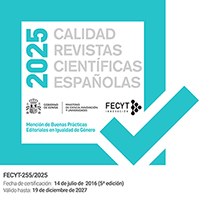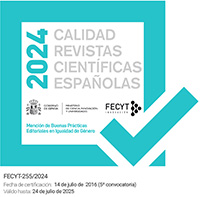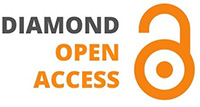Foreigners Control on Pedro Menéndez de Aviles Expeditión to La Florida. The Case of the San Pelayo Galleon (1565-1567)
DOI:
https://doi.org/10.5944/etfiv.37.2024.37242Keywords:
Foreigners; Mutiny; Huguenots; Florida; Pedro Menéndez de AvilésAbstract
At the end of the year 1565, in the course of an expedition to La Florida, the overwhelming foreign crew of the San Pelayo galleon mutinied and after a turbulent journey got shipwrecked in the coast of Denmark. The trial that took place against a young greek cabin boy for his involvement in this upheaval will allow us to explore the reasons that explain the inability of the spanish crown to man with natives the ships that crossed the Atlantic bound to Indias, both commercial and militar vessels. At the same time we will be able to verify that the same authorities that had to implement the rules against foreigners, were the first to forget their duty and resort to alien sailors to solve the scarcity of spaniards willing to go aboard. Finally, the study of the cabin boy defence during the trial will enable us to have a glimpse of the greek colony in the city of Cadiz.
In this sense, this paper defends that, against a negative view of the role of the foreigners in the spanish colonies, their presence shaped the running and development of the spanish colonial trade up to the point that, without them, it would have not been posible. Even though in times as this they were the cause of serious losses for the crown.
Downloads
Downloads
Published
How to Cite
Issue
Section
License
Copyright (c) 2024 Alberto Abasolo Barandika

This work is licensed under a Creative Commons Attribution-NonCommercial 4.0 International License.
Los autores que publican en esta revista están de acuerdo con los siguientes términos:
- Los autores conservan los derechos de autor (copyright) de las obras publicadas y garantizan a la revista el derecho de ser la primera publicación del trabajo al igual que permiten la reutilización del mismo bajo la licencia de uso indicada en el punto 2.
- Las obras se publican en la edición electrónica de la revista bajo bajo una licencia Creative Commons Reconocimiento-NoComercial 4.0 Internacional, que permite a otros compartir el trabajo con un reconocimiento de la autoría del trabajo y de la publicación inicial en esta revista. Se pueden copiar, usar, difundir, transmitir y exponer públicamente, siempre que: i) se cite la autoría y la fuente original de su publicación (revista, editorial y URL de la obra); ii) no se usen para fines comerciales.
- Se permite y se anima a los autores a difundir electrónicamente las versiones pre-print (versión antes de ser evaluada) y/o post-print (versión evaluada y aceptada para su publicación) de sus obras antes de su publicación, ya que favorece su circulación y difusión más temprana y con ello un posible aumento en su citación y alcance entre la comunidad académica (por ejemplo, en repositorios institucionales o en su propio sitio web). Color RoMEO: verde. (Véase The Effect of Open Access) (en inglés).
Authors who publish in this journal agree to the following terms:
- Authors retain copyright and grant the journal right of the first publication with the work simultaneously licensed under a license Creative Commons Reconocimiento-NoComercial 4.0 Internacional that allows others to share the work with an acknowledgement of the work's authorship and initial publication in this journal.
- Authors are able to enter into separate, additional contractual arrangements for the non-exclusive distribution of the journal's published version of the work (e.g., post it to an institutional repository or publish it in a book), with an acknowledgement of its initial publication in this journal.
- Authors are permitted and encouraged to post their work online (e.g., in institutional repositories or on their website) prior to and during the submission process, as it can lead to productive exchanges, as well as to earlier and greater citation of the published work (See The Effect of Open Access).









